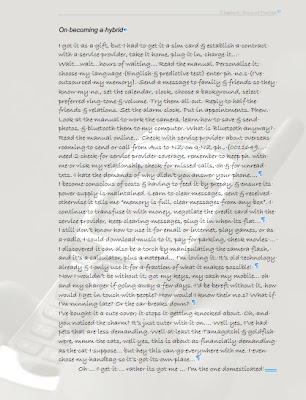On becoming a PhD: just who is being domesticated in the writing
The PhD as a space for creative writing is sometimes considered risky, however if the coherence is able to be argued then creative writing can be included. This is a page from the thesis, it was written in bradley hand script over an image of a cell phone. The intent being the sense of closeness, the companion species that a mobile phone might be seen as. Studying materiality made the materiality of how work was presented important.
On becoming a hybrid
I got it as a gift, but I had to get it a sim card & establish a contract with a service provider, take it home, plug it in, charge it… Wait…wait…hours of waiting… Read the manual. Personalise it; choose my language (English & predictive test) enter ph. no.s (I’ve outsourced my memory). Send a message to family & friends so they know my no., set the calendar, clock, choose a background, select preferred ring-tone & volume. Try them all out. Reply to half the friends & relations. Set the alarm clock. Put in appointments. Phew. Look at the manual to work the camera, learn how to save & send photos, & bluetooth them to my computer. What is Bluetooth anyway? Read the manual online… Check with service provider about overseas roaming to send or call from Aus to NZ on a NZ ph., (0011649… need 2 check for service provider coverage, remember to keep ph. with me or risk my relationship, check for missed calls, oh & for unread txts. I hate the demands of why didn’t you answer your phone….
I become conscious of costs & having to feed it by prepay, & ensure its power supply is maintained. Learn to clear messages, sent & received otherwise it tells me “memory is full, clear messages from any box”. I continue to transfuse it with money, negotiate the credit card with the service provider, keep clearing messages, plug it in when its flat…
I still don’t know how to use it for email or internet, play games, or as a radio, I could download music to it, pay for parking, check movies … I discovered it can also be a torch by manipulating the camera flash, and it’s a calculator, plus a notepad… I’m loving it. It’s old technology already & I only use it for a fraction of what it makes possible!
Now I wouldn’t be without it; got my keys, my cash my mobile… oh and my charger if going away a few days. I’d be bereft without it, how would I get in touch with people? How would I know their no.s? What if I’m running l8? Or the car breaks down?
I’ve bought it a cute cover; to stop her getting knocked about. Oh, and you noticed the charm? she's just cuter with it on…. Well yes, I’ve had pets that are less demanding. Well at least the Tamagotchi & goldfish were, mmm the cats, well yes, this is about as financially demanding as the cat I suppose… but hey now me and my cell go everywhere together. I even chose my handbag with the outside pocket so she's always at hand while also having her own space…
I’m the one domesticated!
(And as for being domesticated, the computer word doc and pdf doc required so many more accommodations on my part, having to choose a font that would stay stable across both PC and mac was problematic- thanks to Andrew LAvery of Academic consultancy, that particular issue got sorted somewhat.)
Thanks extended to Donna Haraway who described stories of materialised refiguration; stories where metaphor and materiality implode. She provided the provocation to think of how technologies are not so much separated from our existence. In addition she provoked consideration for the realtionships we might have/I might have with companion species.
Thanks as well to Bruno Latour for writing in ways that demonstrate that freedom and creativity need not be excluded from academic writing, a genre he refers to as scientification. He prompts consideration for symmetry in the analysis of our relationships with beings human or otherwise, that they might be interrogated on an equal footing (so to speak).
Thanks also to Karen Barad for her writing of identity and agency reflecting ongoing reconfigurations,
and the sure knowledge that boundaries do not sit still.
Refs of specific interest:
Barad, K. (2003). Posthumanist performativity: Toward an understanding of how matter comes to matter. Signs: Journal of Women in Culture and Society, 28(3), 801-831. doi:10.1086/345321
Haraway, D. (2008). When species meet. Minneapolis, MN: University of Minnesota Press.
Latour, B. (1996). Aramis: Or the love of technology (C. Porter, Trans.). Cambridge, MA: Harvard University Press.



